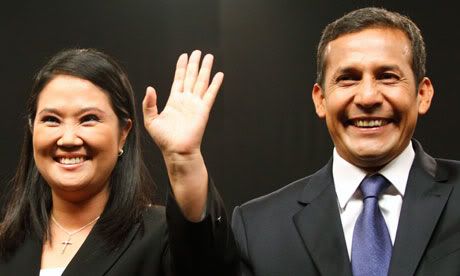I must admit that my interest is at least partly fueled by the fact that the first seven years of my life were spent in Peru. But even that didn't affect me much until a few years ago when I got curious about the sea change that was happening there politically.
While Chavez gets all the attention, the people of South America are standing up all over the continent to elect their own leaders after years of colonization, repression, and dictatorships - often supported by our own government in DC. Leaders like Evo Morales in Bolivia, Dilma Rousseff in Brazil and Rafael Correa in Ecuador are each doing things their own way. But overall democracy is spreading in South America in ways that the "Arab Spring" is only beginning to see.
Its in that context that the election Sunday in Peru is important. The candidates represent a clear return to the past and a somewhat uncertain potential to join the movement of the future. They are Keiko Fujimori and Ollanta Humala respectively.

Keiko Fujimori is the daughter of former President Alberto Fujimori who fled the country during his term due to evidence related to serious corruption. Two years ago he was convicted of human rights abuses and is now in prison. Fujimori was president during the bloodiest conflict in the history of Peru. He is also responsible for things like the mass sterilization of over 200,000 people in rural Peru. To get an idea of what his administration meant to the people of Peru, watch the trailer of this movie "State of Fear."
Keiko Fujimori has surrounded herself with people involved in her father's administration. Many believe that she is just a proxy for him and that he will actually be calling the shots from his jail cell.
As for her opponent Ollanta Humala, I find it hard to read the reports about him. That's mostly because much of the South and North American media tend to demonize Chavez and tie anyone who they oppose to him. Humala actually ran for President and lost in 2006 and seemed to embrace Chavez.
In his failed 2006 bid for Peru’s presidency, Ollanta Humala donned red T-shirts, boasted of plans to assert state control over energy resources and blasted opponents for warming to the United States, using elements from the playbook that was then helping propel leftist political allies of Venezuela to electoral victories in Latin America.
But now, he's singing a different tune.
But in a transformation this year that points to the eclipse of Venezuela by Brazil, Mr. Humala has swapped the red shirts for dark suits, explicitly rejected talk of seizing private companies and celebrated Brazil’s market-oriented economic model, while distancing himself from Venezuela’s president, Hugo Chávez.
Humala once served in the military and has a confusing history there are well. He both led an insurgency against President Fujimora and has been accused of human rights abuses on behalf of the military against civilians.
It sounds as though the people of Peru are facing something that we in the U.S. often have to grapple with - having to choose between the lesser of evils.
Fearing a return to the authoritarianism and generalized corruption of the government of Ms. Fujimori’s father...the Nobel laureate Mario Vargas Llosa said he preferred Mr. Humala, “unhappily and with fear.”




No comments:
Post a Comment